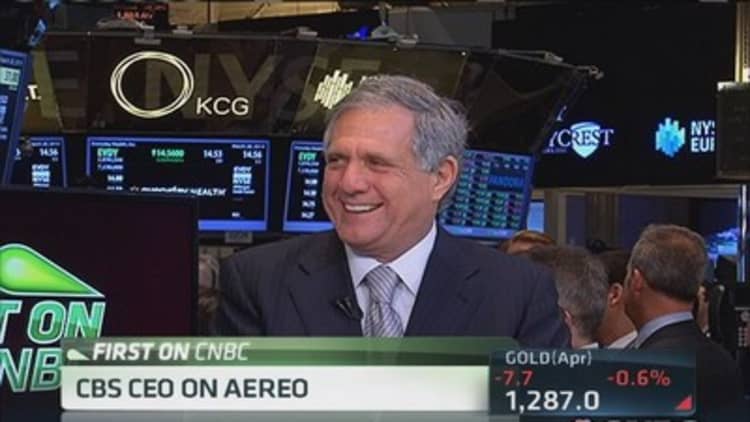To its creators and backers, Aereo — an Internet-connected antenna the size of a penny — is an innovative way to spread the reach of television programs online. To the broadcast networks, it's simply stealing. The Supreme Court will decide who's right.
Now available in about a dozen U.S. cities, mostly on the East Coast, Aereo allows a user, for a minimum of $8 a month, to watch over-the-air TV programs on a smartphone, tablet or computer. Customers can watch their selections live, with the ability to pause the streaming content, or record them for viewing later.
More from NBC News:
Spike in Earthquakes? An 'Illusion' Raises New Questions
Biden Touches Down in Ukraine With Crisis Deal Under Threat
Happy 25th Birthday, Game Boy
Chet Kanojia, Aereo's CEO, says the system mimics regular home equipment, including a television antenna and a device for recording programming.
"We've consolidated those two technologies and located them remotely, so consumers can enjoy broadcast TV, as they have for a very long time, except they can do it for a very low cost and on any device that they choose," he says.
Shortly after the service was launched last year in New York City, the nation's major broadcast networks filed a lawsuit claiming that Aereo illegally retransmits their programs without paying for them. The court will hear oral arguments Tuesday.
Read More
The networks say Aereo is simply taking signals from over-the-air TV and selling them to people for a profit.
"We have a technical legal term for that: It's called theft," said Neal Katyal, a Washington lawyer representing the broadcasters.

NBCUniversal, the parent company of NBC News, is among the challengers. Lower federal courts have split on Aereo's legality.
Billions of dollars are at stake. For Aereo, it's the future of the company. For the broadcasters, a ruling in favor of Aereo could undercut the legal foundation requiring cable and satellite services to pay copyright fees to carry network programs.
At the heart of the case is a provision of federal law that applies to the public performance of copyrighted works, which includes programs broadcast on television.
The law covers transmitting a program "to the public, by means of any device or process, whether the members of the public capable of receiving the performance or display receive it in the same place or in separate places and at the same time or at different times."
Read MoreTech TV biz Aereo not sweating Supreme Court case
Aereo argues that it is not covered by the law because of the way its system is designed. When a user chooses a program to watch, a single micro-antenna is assigned to receive the chosen station. The signal is sent to a sector of a video recorder dedicated to that choice and then streamed to the customer.
For that reason, the company says, it does not create a public performance. Even if thousands of users watch the same program, Aereo says, it creates thousands of individual performances.
"Aereo's equipment enables only private performances, because each transmission is available only to a specific user," writes Washington lawyer David Frederick in his Supreme Court brief representing the company.
Read MoreMoonves on Aereo: Maybe we'll build our own!
But the broadcasters, in their submission to the Supreme Court, say the test of the copyright law is "whether an alleged infringer is transmitting a performance to the public, not whether multiple people are capable of receiving each transmission."
The Obama administration is siding with the broadcasters but urges the justices to rule narrowly and not "call into question the legitimacy of innovative technologies that allow consumers to use the Internet to store, hear, and view their own lawfully acquired copies of copyrighted works."
The Supreme Court will decide the case by late June.
—By Pete Williams, NBC News

